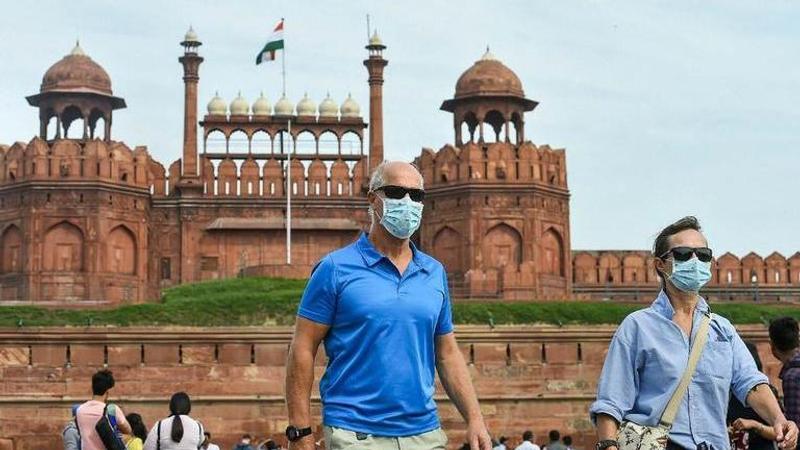Published 08:57 IST, August 26th 2020
Patients from outside, reopening of economy behind rise in COVID-19 cases in Delhi: Experts
COVID-19 patients from outside Delhi seeking treatment here, reopening of the economy and low sensitivity of rapid antigen tests might be behind the recent rise in instances of the viral disease in the city, experts have said

COVID-19 patients from outside Delhi seeking treatment here, reopening of the economy and low sensitivity of rapid antigen tests might be behind the recent rise in instances of the viral disease in the city, experts have said.
The positivity rate had declined to below six per cent by July end after hovering around 30 per cent at the beginning of June. Cases too had started declining. But in the last one week, there has been a spike in cases.
According to the Delhi government's health department bulletin on Monday, the positivity rate is 8.9 per cent. This has left experts worried.
On Tuesday, Delhi recorded the highest single-day spike in cases in August at 1,544, surpassing Sunday's figure of 1,450. Delhi has seen a fluctuation in the number of coronavirus cases since August 1.
On August 1, the city recorded 1,118 fresh cases and for the next three days, the number of single-day infections stayed below the 1,000. From August 5 to August 9, the number of fresh COVID-19 cases again stayed above the 1,000-mark, only to come down to 707 on August 10.
Between August 11 and August 22, three days saw less than 1,000 fresh cases being reported. On August 13, the city registered 956 new COVID-19 cases, August 16 had 652 fresh instances of the viral disease, and August 17 reported 787 cases.
Co-incidentally, the number of examinations for the detection of COVID-19 conducted on the days the capital recorded cases less than 1,000 were below the average 20,000 tests being conducted daily, according to data.
Dr BL Sherwal, the medical director of the Rajiv Gandhi Super Speciality Hospital, said with people resuming work, the surge was expected.
"Almost everything is opening up... But if (daily) cases cross 2,000, then it's a cause of worry. There is a slight surge but we will not say it's worrying as far as illnesses are mild or asymptomatic. The mortality is in control and that is a big relief for all of us. Overall people are taking precautions," he added.
Dr Rajesh Chawla, senior consultant, respiratory and critical care medicine, Apollo Hospitals, said the surge can be partially attributed to people coming from outside.
"In Apollo, 70 per cent of patients admitted are from outside Delhi. Patients come to Delhi for better healthcare facilities. Their relatives are roaming around, some of whom are also positive cases," he added.
Experts also said the positivity rate dropped because of the rapid antigen tests, which are less sensitive. Delhi had commenced rapid antigen testing from June 18, and since then, the national capital's testing rate also rose to an average of 20,000 tests daily.
Ramanan Laxminarayan, the director of US-based Center for Dynamics, Economics and Policy said there has been no real flattening of the curve in Delhi. The positivity rate dropped in between because the method of testing was changed.
The rapid-antigen methodology is less sensitive -- reported to be less than 50 per cent, so there is no real reduction in the number of cases, he said.
"It is throwing up a lot of false negatives. False-negative are people who test negative through antigen test and think that they have not contracted the virus. They are positive," Laxminarayan said.
"Not many are affected in Delhi. No doubt there will more cases in the days to come," he said.
Dr (Col) Vijay Dutta, consultant, Internal Medicine for Respiratory Disease at the Indian Spinal Injuries Centre, said their institute never witnessed a decline in the number of patients, which has remained constant.
He concurred with Laxminarayan and said rapid antigen tests can throw up a false negative in 50 per cent of the cases, which means that if one is positive, it will not show them as positive.
"In most of the time, the rapid antigen test is being conducted. RT-PCR tests will detect the positive patients," Dr Dutta added.
Dr KK Agarwal, president of Heart Care Foundation of India, says Delhi has not yet reached its COVID-19 peak.
The second serological survey revealed that only 29 per cent of the people in Delhi have antibodies. A surge in the positivity rate will come and go till the time this number rises to 60 per cent. The national capital is going to witness a second peak, he said.
"Also, a large number of people did not get themselves tested when the number of cases increased rapidly in June. They are undergoing tests now... since they have the antibodies, they are diagnosed positive during the rapid-antigen testing," Dr Agarwal said.
Image credits: PTI
Updated 08:57 IST, August 26th 2020




